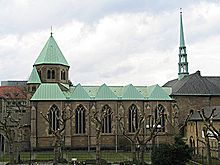Germanicae gentis
Germanicae gentis ( Latin : "... of the German people") is the title of the Apostolic Bull with which Pope Pius XII. on February 23, 1957 ordered the establishment of the diocese of Essen .
intention
“The large number of places of worship, pious foundations and institutions from ancient times bear witness to how lively the faith and religious zeal of the German people has been over the centuries. It is well known that, with God's help, this attitude has increased today after the lamentable divisions and vicissitudes of the past centuries. For this reason, We [...] considered it appropriate to establish a new diocese there for the benefit of the Christian people. "
With these words the Pope introduces his bull and also gives a reason for the establishment of a new diocese .
Church treaty
For this purpose, on December 19, 1956, a treaty was concluded between the Holy See and the State of North Rhine-Westphalia in accordance with Article 2.9 of the Prussian Concordat . For this purpose, the advice of Aloysius Joseph Muench , Archbishop of Fargo and Apostolic Nuncio in Germany, as well as the statements of Joseph Cardinal Frings , Archbishop of Cologne , Lorenz Jaeger , Archbishop of Paderborn and Michael Keller , Bishop of Münster , were obtained. Together, the territorial limits of the new were diocese established as a bishopric , the city of Essen has been nominated bishop's church, the Church of St. John the Baptist ( "was Münsterkirche ") determines the name diocese of Essen has been set. The new bishop's chair in Essen belongs to the Cologne Metropolitan Church as a suffragan , in the further course of the circumscription bull individual instructions, privileges, rights and obligations according to canon law are given.
For the fiftieth anniversary
On the fiftieth anniversary of Benedict XVI. in his message:
“With the introduction of the first bishop, the unforgotten later Cardinal Franz Hengsbach , January 1st, 1958, marked the beginning of a new diocese in Germany: the Church of Essen. A particular Church does not found the Church every day, not in all places, and certainly not without good reason. It was then that my venerable predecessor, Pope Pius XII. Regarding the establishment of a diocese: 'The faith that has been lived for centuries and the religious zeal of the German people is an occasion for me to establish a new diocese there for the welfare of the Christian people from the archdioceses of Cologne and Paderborn and the diocese of Münster' (Bulle Germanicae gentis from 23. February 1957). A few decades earlier there was such a plan, 'so that the church', it was said, 'would come closer to the working people in the constantly growing conurbation and be more deeply rooted'. In order to be able to live and work in a Christian way in the world of industry, in companies underground and above ground, in the tensions between social commitment and economic interests, to which the individual was almost powerless, the 'Ruhrbistum', as it was soon called, was called should be established. With him the 'Cross of Christ over coal and iron' was erected, accompanied by great hopes and high expectations. "
